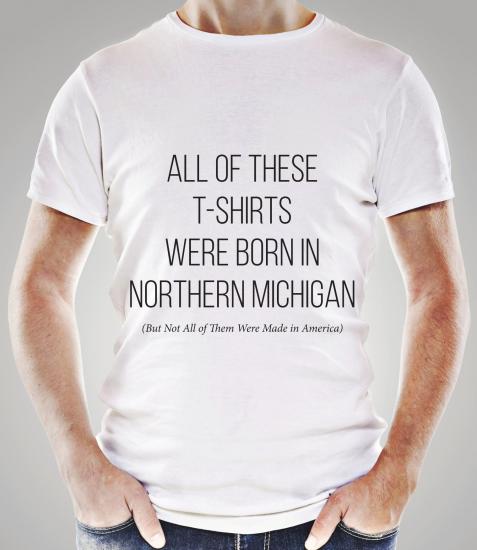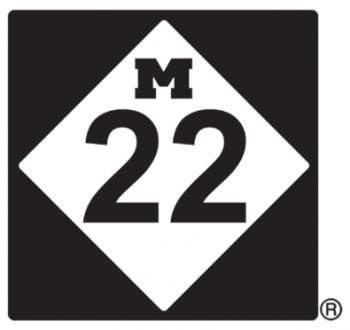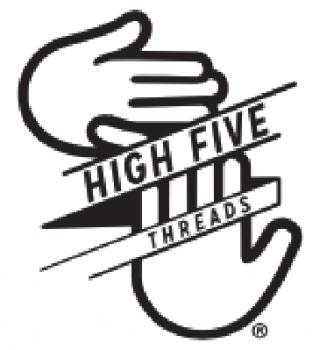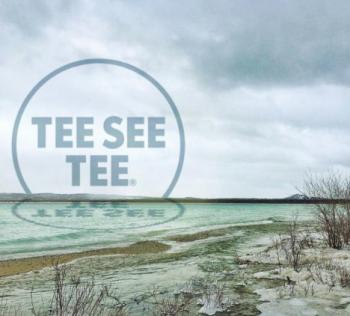All of These T-shirts Were Born in Northern Michigan
(But Not All of Them Were Made in America)
April 8, 2016

Go anywhere in the country and you can find a quirky T-shirt shop that celebrates that particular place. Go to a tourist town and there will be several. Look at Traverse City; it’s got M-22, High Five Threads, the Roth Shirt Co., Tee See Tee, not to mention shops, wineries and breweries that create their own designs.
With this celebration of appellation comes a race to be more clever, more authentic and more local – which has sparked another debate. Should these items that celebrate the places we love be made in America? And what does made in America really mean?

COMPLAINT OVER MISSING TAG
Mike Draper was shopping for T-shirts in Suttons Bay last summer when he noticed something odd about one of the labels. Tags that should have identified the garment as coming from Bangladesh were gone and, in their place, was the moniker "Made in the USA of imported materials."
Draper knows something about the T- shirt business. He runs a company that celebrates all things Iowa back in his hometown of Des Moines. He thought this tag was deceptive. He called M-22 to make a complaint.
"I think I called them a couple of times and then I finally heard back," Draper said. "I was like, "˜FYI, your label violates the FTC.’" Draper was right. Julia Ensor, an attorney with the Federal Trade Commission in Washington, D.C., said "Made in America" rules are clear.
"In order to make the claim "˜made in the United States of imported materials,’ the T-shirt would need to be cut and sewn in the United States out of imported fabric," she said.
Nate Farran, product buyer for M-22, said the company wasn’t trying to be deceptive. There was still a tag inside that identified it was made in Bangladesh; M-22 wanted to emphasize all of the other work that went into the shirt. The design, the screen printing and the creation of the brand all happened in Michigan.
Farran said the company has since changed its labels to be clearer about origin.
"Basically, we’re being more aware. We weren’t aware before, so basically the guy from Iowa kind of brought it to our attention," he said. "We’ve actually changed everything."¦ It still says designed and printed in northern Michigan; below we do state the place of origin."

"I WANT ALL MADE IN MICHIGAN"
M-22 buys foreign-made T-shirts from United States companies. That means that, even if the shirt comes from South America or Bangladesh, most of the money stays in the U.S., Farran said.
Farran said the company has also investigated the conditions where its T-shirts are manufactured to make sure workers are not exploited. Using American-made T-shirts would be prohibitively expensive, he said.
Still, the company strives to sell as many American-made products as possible, he said, and they’d like to have everything Michigan made.
"Apparel is tough; anything else is relatively a little easier," he said. "For instance, our frisbees are made by Discraft. Discraft is right in Dearborn, Michigan."
They also do all of the embellishment of their glassware and screen printing in Michigan.
"It’s one of the hardest jobs that I have is sourcing through a company to get something that’s U.S. made," Farran said. "It’s really, really difficult. We do our best. Seriously, we try as hard as we possibly can. I want it all made in Michigan."
ARTISANAL KEY CHAINS
Draper, who has a family summer home in Lake Leelanau that he’s visited all his life, said he’s been in the T-Shirt business for a decade and he’s made it a priority to use as much American-made product as he can.
His small chain of stores called Raygun sells shirts that say snarky things like "DES MOINES: HELL YES," "BEAT THE OTHER TEAM" or "YOU’VE CAT TO BE KITTEN ME RIGHT MEOW."
"All of our T-shirts are produced sweatshop free in California," he said. "We’ve always taken the supply chain stuff really seriously."
Raygun, which uses shirts from American Apparel, said for higher-end T-shirts, to buy American costs $5 or $6 wholesale per shirt, about a dollar more than it would cost to buy a foreign-made shirt. For a lower quality shirt, the difference between American and Bangladeshi or Honduran is starker.
In that case, it could be more expensive to buy American by $3 per shirt, he said.
Draper believes T-shirts should cost a couple bucks more to ensure they are not the product of exploited labor, though he acknowledged it’s not feasible to buy everything made in America.
"Even if it’s important to me, which it is, to purchase ethically-produced products, it’s not like everything I wear is ethically produced. It’s pretty tough to do," he said.
While he cuts himself some slack when it comes to his wardrobe, he doesn’t when it comes to his store.
"It’s not up to the consumer to have to comb through labels and find out where the stuff is made," Draper said.
Draper buys American made whenever he can. That includes T-shirts, glasses and paper products. He sells imported plastic key chains because, he said, there is no alternative.
"It’s going to be hard to find key chains that are made in America," he said.

IMPORTED TEES: MORE JOBS
Beau Warren worries people don’t understand the economic benefits that come from a T-shirt that’s designed, printed and sold in the U.S., but made in another country.
"It’s a huge issue that we deal with on a regular basis," said Warren, founder of Tee See Tee. "There’s a big misconception of the whole "˜American made’ being good for the economy."
Warren said his 3-year-old business employs six people; in a year he hopes to employ a dozen. Warren said he is able to create those jobs because he can sell highquality T-shirts at competitive prices. He doesn’t believe he could do that if he used American-made T-shirts.
Warren said some companies are in a position to use American-made T-shirts, but his young company hasn’t reached that point.
"In order for us to sustain our business, we have to be able to provide a high-quality item that people can afford," Warren said. "If you get to the point where you can scrape a few percentage points off your profit margin, good for you. We aren’t there yet."
At Tee See Tee, T-shirts cost $25 and hoodies are $56. Those prices are similar to M-22. Prices are roughly the same at High Five Threads, which sells shirts that have labels identifying them as American made. High Five did not respond to messages for comment.

SWEATSHOP-FREE SWEATSHIRTS
Tee See Tee’s products used to feature tags that played with the notion that the shirts were designed and printed in Michigan. Warren said the company cut that out because he was concerned they could get into trouble.
"You have to be very specific about where your product comes from and you can’t tiptoe around that with various phrases," Warren said.
What’s most important, he said, is that the shirts Tee See Tee sells are not produced by slave labor. Tee See Tee only uses suppliers that are "certified sweatshop free."
Warren said, as long as employees are treated well through the production of the shirt, he’s okay with shirts that are imported from overseas.
Indeed, even in a country like Bangladesh, where sweatshop-style working conditions at some manufacturers have made international headlines, the garment industry is seen as a means to improve living conditions for some of the poorest people of an impoverished country.
Tee See Tee uses shirts made in South America.
"It’s at least still manufactured on this continent, and that’s important to us," Warren said. "To be certified sweatshop free, that means the people that work there are treated fairly. In a global economy, that really should be the thing that we’re all worried about."

TCFF MADE IN THE USA
The Traverse City Film Festival was cofounded by Michael Moore, champion of the American worker, so they must have always used American-made shirts for their souvenirs and volunteers, right?
Not exactly, but the festival strove to reach that point and, today, all of the shirts associated with the festival are made in the USA.
Souvenir merchandise was transitioned to American made around 2009 and, in the past couple years, the volunteer shirts have all been sourced from inside the country, as well.
"All of our volunteer T-shirts and our merchandise are American made," said Meg Weichman, film festival creative director. "For several years we’ve done that. It was a priority to us."
While it was important for the festival to act according to its values, it was also costly.
"We certainly take a financial hit by selling American-made shirts," she said. "The margin is not nearly as large, and our profit on merchandise has declined, but we strongly believe we are offering our patrons a superior product and that it reflects the overall experience we try to offer at our festival."
Farran said it’s one thing for a nonprofit with a couple of different designs to go that route; it becomes unrealistic when you run a store like M-22 that carries more than 900 different products.
"As far as having a diverse product line, like something to actually open a store with, it’s virtually impossible to do what they’re doing," he said. "Yes, I can go out and buy one gray American Apparel T-shirt and print 900 of that, but that doesn’t make sense to someone like us or High Five Threads."
Trending

The Valleys and Hills of Doon Brae
Whether you’re a single-digit handicap or a duffer who doesn’t know a mashie from a niblick, there’s a n... Read More >>
The Garden Theater’s Green Energy Roof
In 2018, Garden Theater owners Rick and Jennie Schmitt and Blake and Marci Brooks looked into installing solar panels on t... Read More >>
Earth Day Up North
Happy Earth Day! If you want to celebrate our favorite planet, here are a few activities happening around the North. On Ap... Read More >>


